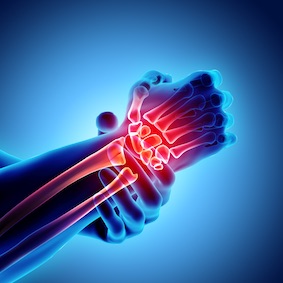What is rheumatism?
There are many types of rheumatic diseases; rheumatoid arthritis (RA) is one of them. Others include arthrosis and ankylosing spondylitis (AS), also known as Bechterew’s Disease (inflammation of the spinal joints). RA is an autoimmune disease; the immune system mistakenly attacks the body and makes it more vulnerable to bacteria or viruses. This can cause infections in joints but also in tendons, muscles, organs, blood vessels or nerve tissue. Inflammation of the lining of joints (known as arthritis), leads to overproduction of the fluid surrounding the joint, which can cause bony lumps (bone spurs) to develop in the affected area. Cartilage and bone damage may already occur in an early stage of rheumatism and can possibly worsen in later stages.
Common rheumatism complaints and symptoms
RA is a chronic disorder with an unpredictable course; there may be periods when the symptoms are worse but there will be quieter times too. Inflammation of the lining of a joint can be painful; your joint can feel hot to touch and seem swollen. However, in the early stages of arthritis, swellings are hardly visible. You might experience pain under the ball of your foot when you walk, stiffness in your fingers or swelling in your hands. Joints become painful and stiff, especially if you have been sitting or lying in the same position for a while. This makes moving around more difficult. Unfortunately, lack of movement has a negative impact on your health and causes a reduction in muscle strength which makes physical activity even more difficult.
Another very common complaint in patients who suffer from RA is chronic fatigue. This type of fatigue can have many underlying causes such as pain or psychological strain but could also be an indicator of anaemia. Additional symptoms include reduced sleep, mild fever, general muscle weakness and a lack of appetite.
Rheumatism incidence and who it affects
According to Reuma Nederland (the Dutch National Rheumatoid Arthritis Society), around 2 million people in the Netherlands are living with a type of rheumatic disease. Rheumatism can affect anyone at any age. People often assume rheumatism is a condition only older people develop, but this is not the case: 61% of people diagnosed with rheumatism are under the age of 65. Rheumatism can also affect children. For most types of rheumatism, the cause is yet unknown. Rheumatic diseases cannot be cured and are therefore referred to as chronic. However, pain relief can be achieved with a personalized treatment plan that focuses on you and how you can manage your type of rheumatic disease and reduce your symptoms.
Self-help for rheumatism
A change in lifestyle should be your number one priority, as well as maintaining a healthy body weight. Smoking should be avoided as well as the use of other harmful substances. A regular and well-balanced exercise routine is essential and will reinforce the specific exercises a physiotherapist has suggested for staying active too. It is recommended to exercise at a moderate intensity level at a minimum of five days a week for at least half an hour or longer. This also benefits your overall physical condition. You could, for instance, go for a walk, cycle, climb the stairs up and down, garden or go swimming. This would all be in addition to your personalized exercise plan. Most sports and exercises are suitable for people with rheumatism. Contact sports, however, are less advisable, and so are sports that involve sudden actions. High impact sports put a great deal of stress on your joints, which can cause complaints too.
Tips for managing your symptoms:
- Try and do some sort of physical activity for at least thirty minutes a day.
- Avoid high impact work-outs; if the exercise you’re doing is too intense it can put too much stress on your joints
- Take short breaks while you’re exercising.
- Slowly increase length, intensity and frequency of your exercise. Make sure that you do all the exercises in your personalized workout and that you do them every day.
- Work out on soft flooring if that is more comfortable for you.
- Wear shoes with shock-absorbing soles.

Physiotherapy treatment for rheumatic complaints
Physiotherapy should focus on optimizing you daily routine. It is essential for you to maintain a high level of fitness and for your muscles to keep as strong as possible; this will help you to stay active and do the things you want to do. A physiotherapist can give you general life-style advice and exercise tips as well as show you a realistic and healthy way to improve your fitness level.
You will also be given exercises aimed at maintaining your muscle strength, or even improving it. The exercises will also focus on reducing stress on the joints. It is important to remember that improvement in muscle strength enhances joint stability and lowers the risk of further damage. The aim is to maintain as much independence as possible, so all exercises are based on your personal situation with a focus on maintaining, or possibly even improving, your daily routine. As a result, your symptoms will ease and the risk of causing any further damage to your joints, muscles and tendons, will become smaller.
A physiotherapist will work closely together with your rheumatologist and will design your work-out regime carefully considering your specific medication. He or she will advise which tools to use in case of any permanent physical limitations to your daily movements. There are specialist physiotherapists for people with rheumatoid arthritis. They are often connected to a hospital and/or health care institution.
Which other physical complaints does FysioCity treats?
Book an appointment
 NL
NL